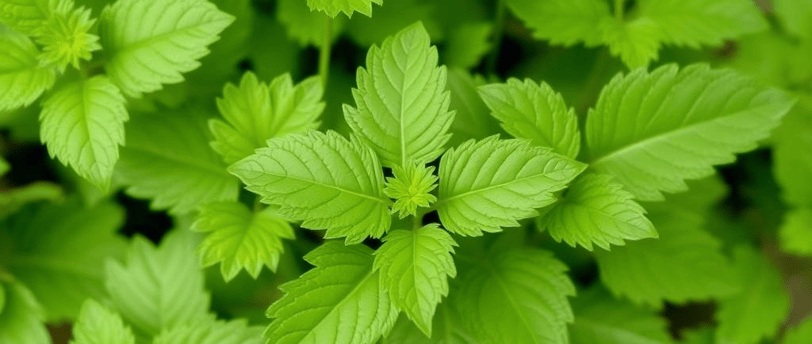Nettle for Heart Health: The Nutrient-Rich Herb That Supports Cardiovascular Function
❤️HEART HEALTH


Nettle, scientifically known as Urtica dioica, is often dismissed as a mere weed. However, this powerful herb has a long-standing history of use in traditional medicine, particularly for its myriad benefits to heart health. With its rich nutrient profile, including vitamins, minerals, and antioxidants, nettle has established itself as a valuable addition to a healthy diet. This article explores the various forms available, recipes, dosage, side effects, precautions, and the scientific basis behind using nettle for cardiovascular function.
Understanding Nettle
Nettle has been utilized for centuries in herbal medicine, dating back to ancient Rome and Greece. This robust herb is packed with nutrients, such as vitamins A, C, K, and B vitamins, along with minerals like magnesium, iron, calcium, potassium, and omega-3 fatty acids. Additionally, nettle contains bioactive compounds that have demonstrated anti-inflammatory and antioxidant effects.
Forms Available
Nettle is available in several forms, making it versatile and easy to incorporate into your daily routine. Here are some of the most common forms you can find:
Fresh Nettle Leaves: Often used in salads, soups, and teas, fresh nettle leaves are a nutritious addition to meals. They have a mild, grassy flavor when cooked, making them an excellent substitute for spinach.
Dried Nettle: Dried nettle can be used to make teas and herbal infusions. It is an ideal option for long-term storage and can be easily added to recipes.
Nettle Extracts: These concentrated forms of nettle are available as tinctures, capsules, or powders. Extracts are often used for their health benefits, especially in supplements designed for heart health.
Nettle Tea: Brewed from fresh or dried leaves, nettle tea is a soothing way to extract the herb's nutrients and therapeutic properties.
Recipes to Incorporate Nettle
Incorporating nettle into your diet is as simple as preparing a few delicious recipes:
Nettle Soup: Sauté chopped onions and garlic in a pot, add potatoes, vegetable broth, and fresh nettle leaves. Simmer until the potato is tender, and then blend until smooth. Season with salt and pepper for a nutrient-rich soup.
Nettle Tea: Steep 1-2 teaspoons of dried nettle leaves in hot water for 5-10 minutes. Strain and enjoy it hot or iced. For added flavor, consider adding lemon juice or honey.
Nettle Pesto: Blend fresh nettle leaves with garlic, nuts (like pine nuts or walnuts), olive oil, and cheese (Parmesan or nutritional yeast for a vegan version). Use this versatile pesto as a spread, dip, or pasta sauce.
Nettle Risotto: Add blanched nettle leaves to your favorite risotto recipe at the last minute. Their bright green color and mild flavor enhance both the taste and nutritional value of the dish.
Recommended Dosage
When it comes to dosage, it’s essential to approach nettle thoughtfully. Here’s a general guideline:
Nettle Tea: Consume 1-3 cups of nettle tea daily.
Dried Nettle: 1-2 teaspoons of dried nettle leaves can be used in soups and salads.
Nettle Extracts: Follow the manufacturer's instructions, as potency can vary. A typical dosage for tinctures can range from 1-2 mL, taken up to three times daily.
However, always consult a healthcare professional before starting any new supplement regimen or making significant dietary changes.
Side Effects and Precautions
Despite its many benefits, nettle may cause side effects in some individuals. Common side effects include:
Allergic Reactions: Some people may experience allergic responses, such as skin rashes or respiratory issues. If you have a known sensitivity to nettle or related plants, avoid its use.
Gastrointestinal Issues: High doses of nettle may lead to gastrointestinal discomfort, including nausea or diarrhea.
Blood Pressure Effects: Nettle might affect blood pressure levels; therefore, individuals on antihypertensive medications should consult their doctor before using nettle.
Pregnancy and Breastfeeding: Pregnant or breastfeeding women should approach nettle with caution, as insufficient research is available regarding its safety in these contexts.
As with any herb or supplement, it’s vital to source high-quality products from reputable manufacturers to mitigate the risk of contaminants or adulteration.
The Scientific Basis for Nettle in Cardiovascular Health
Numerous scientific studies have examined the potential benefits of nettle for heart health. Research indicates that nettle may exert a positive influence on several aspects of cardiovascular function:
Anti-inflammatory Properties: Chronic inflammation is a known contributor to heart disease. Nettle's various bioactive compounds, such as flavonoids and polyphenols, exhibit significant anti-inflammatory effects, possibly reducing the risk of cardiovascular complications.
Antioxidant Effects: The oxidative stress from free radicals has been associated with various cardiovascular diseases. Nettle's antioxidant properties can help combat oxidative damage, promoting overall cardiovascular health.
Blood Pressure Regulation: Some studies suggest that nettle may have a mild diuretic effect, helping to lower blood pressure. By promoting fluid balance and reducing hypertension, nettle may provide additional support for heart health.
Cholesterol Management: Early research indicates that nettle may improve lipid profiles by reducing total cholesterol and triglycerides while increasing beneficial HDL cholesterol levels. This management of cholesterol levels plays a crucial role in maintaining cardiovascular health.
Conclusion
Nettle is far more than an ordinary weed; it is a nutrient-rich herb that has shown promising potential for supporting heart health. With its various forms available, delicious recipes to enjoy, and numerous health benefits rooted in scientific research, incorporating nettle into your diet can be a proactive step towards better cardiovascular function. Nevertheless, always keep in mind the importance of consulting with a healthcare professional before starting any new health regimen. Embrace the powerful benefits of this remarkable herb, and nourish your heart the natural way.
